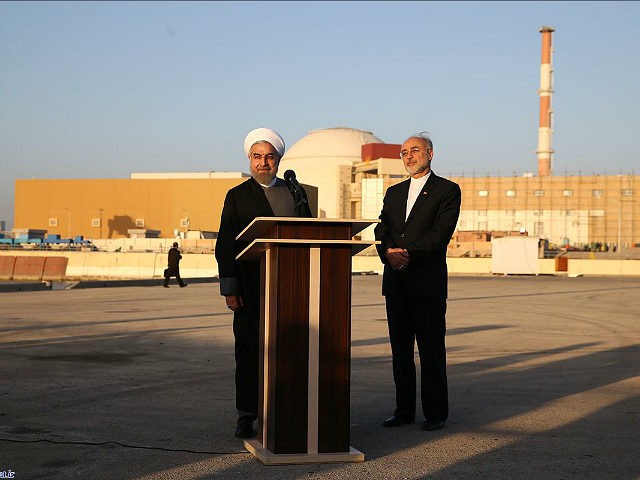Secretary of Energy Rick Perry is on his way to London for meetings with the government of Saudi Arabia on nuclear energy. The Saudis are interested in civilian nuclear power and also in using talks with the United States to push for tighter controls on Iran’s nuclear program.
The Associated Press explains that the Saudis are signaling they will only accept restrictions on uranium enrichment if the Iran deal is tightened:
The separate negotiations, over Saudi and Iranian nuclear capabilities, put American officials in the middle of the great balance-of-power of the modern Middle East. The Saudis are loath to sign away their ability to move closer to bomb-making capability while Iran is bound by a 2015 nuclear accord that will become increasingly lenient next decade.
When President Barack Obama blessed the nuclear compromise with Tehran, his officials insisted they weren’t weakening nonproliferation standards for everyone else. But that difficult task has fallen to President Donald Trump. And the Saudis, among his closest allies, are now asking a simple question: If Iran can enrich, why can’t we?
The Saudis have suggested a number of lucrative contracts for American companies may depend on the answer to that question, although they also appear cautious about alienating a Trump White House that largely agrees with them about the deficiencies of the Iran nuclear deal.
The preceding Obama White House had little patience for arguments that the cause of nonproliferation would be greatly hindered by giving Iran — the most aggressive power in the Middle East — special indulgences for its nuclear program. But even as nuclear negotiations with Tehran entered their final stages, Saudi Arabia and other Sunni states were dropping hints that they would need their own nuclear deterrents once the final restrictions imposed by the Obama nuclear deal dropped away.
NATO has long been concerned the Saudis would simply purchase nuclear weapons from a supplier like Pakistan, and might indeed already have done so, with prepaid express shipping for the day Iran gets the bomb. The Associated Press notes that the United Arab Emirates flatly stated it “no longer felt bound” by the nuclear agreement it signed in 2009 since Iran’s deal was far less strict.
The Associated Press notes that European powers are averse to completely scuttling the Iran nuclear deal, but much more receptive to proposals for tightening it, potentially including new demands that Tehran refrain from interfering in regional conflicts such as the civil war in Yemen. Such conditions would dovetail with Saudi Arabia’s concerns.
For its part, Iran is perpetually threatening to pull out of the nuclear deal, most recently complaining that international banks are still too reluctant to invest in the Islamic Republic, so Iran might as well pocket the benefits it has already collected and get those uranium centrifuges spinning again.
“If companies and banks are not working with Iran, we cannot remain in a deal that has no benefit for us,” Iranian Deputy Foreign Minister Abbas Araqchi grumbled last week.
The plan Perry will discuss with Saudi representatives in London this weekend would reportedly allow the Kingdom to enrich and reprocess uranium, while American companies such as Westinghouse Electric would build nuclear reactors for the Saudis.
If American companies d0 not get those deals, the Saudis will have little trouble finding alternate contractors in Russia or China, especially with an estimated $80 billion in construction deals on the table. Perhaps wary of potential opposition in Congress, and with one eye on the calendar for Crown Prince Mohammed bin Salman’s (MBS) much-anticipated visit to the United States in March, Secretary Perry reportedly canceled a trip to India in order to expedite nuclear talks with the Saudis.
MBS’s visit to the United States is even more momentous because it was supposed to be a trip undertaken by his father, reigning King Salman bin Abdulaziz. The 33-year-old crown prince, who has assumed extraordinary powers as the steward of Saudi Arabia’s transformation into a modern post-petroleum society, is coming instead to encourage foreign investment in his ostensibly liberalized and stabilized country.
As Forbes observers, it would stun the world if MBS announced the long-awaited public offering of stock in the Saudi national oil company Aramco during his visit, although that is unlikely for a number of reasons. The Saudi monarchy and Trump administration will be under pressure to make some other headlines if they cannot make that one. Another possibility would involve the crown prince announcing massive investments in U.S. high technology, particularly robotics and artificial intelligence research. $80 billion in nuclear power plant contracts would grab a few front pages as well.

COMMENTS
Please let us know if you're having issues with commenting.